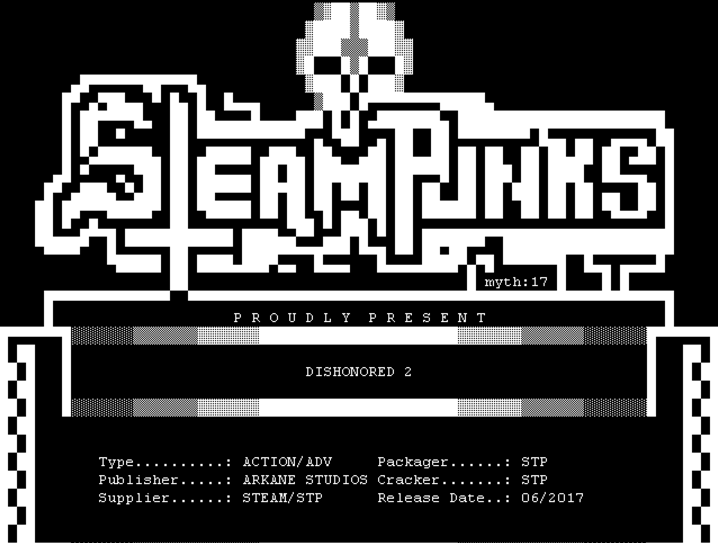Presented keygen for hacking the game Dishonored 2 with the protection system Denuvo, but no one knows how it works

At different times, game developers have tried different ways to prevent their products from being copied and their “pirated” distribution. This was done back in the 80s of the last century, over time the methods of protecting game content became more and more sophisticated. Probably, many Geektimes readers remember StarForce , and how quickly this “unbreakable” protection was hacked. Not so long ago, a new method was introduced, which was called Denuvo Anti-Tamper . During the announcement, its creators proudly spoke of the reliability of the protection it provides. For the first time, Denuvo was introduced in 2014, games protected with this technology require repeated online activation for each hardware upgrade. Plus, the number of activations is limited to 4 different hardware configurations (i.e. installations on different machines) within 24 hours.
In 2016, 3DM crackers abandoned attempts to hack the game Jast Cause 3 due to the fact that the hacking process was already too complicated. Hackers even stated that due to Denuvo, hacking video games could become impossible after 2 years. However, there was a team that still managed to overcome this defense. As it turned out, Denuvo was hacked by a previously unknown group of hackers who call themselves SteamPunks. They laid out the key for hacking the popular game Dishonored 2.
Some features of this key suggest that the Denuvo security system is completely compromised. The fact that the key is laid out and how the group worked is described on Reddit . The most interesting thing is that in order to work on hacking Denuvo, very serious preparation is needed, only professionals can handle it. And all the more surprising that no one has ever heard of the SteamPunks group. Now there are not so many groups that are involved in hacking the protection of games, software, including key generation and other methods. Among the most famous hackers and individual hackers are CPY, Voksi, and Baldman. But SteamPunks? No one knows them, no one has heard of them before.
')
But the group didn’t just hack Denuvo, it’s not done, they did a much more interesting thing: the hackers locked the key to the game using one of the reverse engineering protection methods used by Denuvo co-creators. And this already requires a deep knowledge of the technologies that underlie the method of protecting the content in question.

According to some Reddit users, this unknown group has laid out the equivalent of The Holy Hand Grenade of Antioch . Hackers from SteamPunks say that the key they presented is the first of its kind, and the game content, including executable files, remained intact. A license that is provided with a key may be re-generated, for example, this may be necessary when updating the OS or changing the hardware configuration.
Third-party experts have begun to study the key, but so far no one can say how it works. The code is buried with VMProtect. This is a software system that Denuvo developers used to protect their own products. The presence of protection raises two problems. The first is that for the time being no one is able to understand how the key works. And the second is that it can itself be something other than just a tool for hacking the game protection system. Hackers from the group mentioned above can pursue some goals and secretly spread malicious software along with their key. True, no one has discovered anything like this, but this is still not a guarantee of key security.
About this version of events warn not the creators of the games, copyright holders who want to intimidate the gaming community not wanting to spread the key. No, information security specialists and ordinary users, who have already fallen into the bait of other hackers who distributed malware in a similar way, speak of it.
By the way, the other day, the developers of VMProtect stated that their technology was used by the creators of Denuvo without a license. In early June, the developers of VMProtect announced that they intend to bring the matter to a full-fledged process. However, after a while, the creator of VMProtect, Ivan Permyakov, said that there would be no court: "Information about our relationship with Denuvo Software has long been outdated and has become irrelevant.".
Anyway, Denuvo developers are not having the best time at all. First, they are faced with the leakage of private information from their own website, secondly, they have to prove that content protection technology does not reduce the performance of games, thirdly, the technology itself is compromised. What will this company do? So far it is unclear, it remains only to wait and follow the development of events. Maybe later something will become known about SteamPunks.
Source: https://habr.com/ru/post/373533/
All Articles